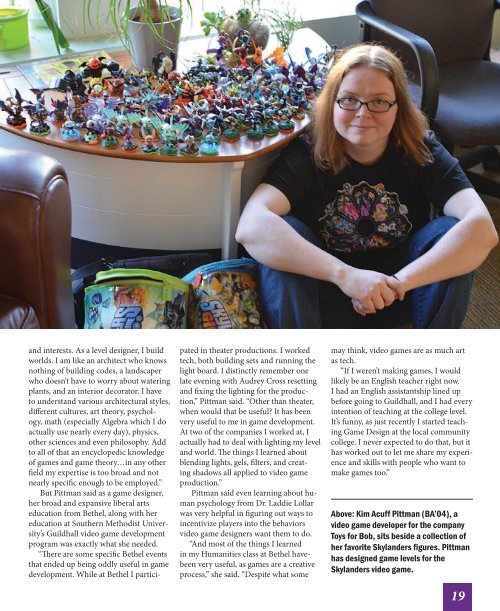Captions Magazine - Bethel University
Captions Magazine - Bethel University
Captions Magazine - Bethel University
You also want an ePaper? Increase the reach of your titles
YUMPU automatically turns print PDFs into web optimized ePapers that Google loves.
and interests. As a level designer, I build<br />
worlds. I am like an architect who knows<br />
nothing of building codes, a landscaper<br />
who doesn’t have to worry about watering<br />
plants, and an interior decorator. I have<br />
to understand various architectural styles,<br />
different cultures, art theory, psychology,<br />
math (especially Algebra which I do<br />
actually use nearly every day), physics,<br />
other sciences and even philosophy. Add<br />
to all of that an encyclopedic knowledge<br />
of games and game theory…in any other<br />
field my expertise is too broad and not<br />
nearly specific enough to be employed.”<br />
But Pittman said as a game designer,<br />
her broad and expansive liberal arts<br />
education from <strong>Bethel</strong>, along with her<br />
education at Southern Methodist <strong>University</strong>’s<br />
Guildhall video game development<br />
program was exactly what she needed.<br />
“There are some specific <strong>Bethel</strong> events<br />
that ended up being oddly useful in game<br />
development. While at <strong>Bethel</strong> I participated<br />
in theater productions. I worked<br />
tech, both building sets and running the<br />
light board. I distinctly remember one<br />
late evening with Audrey Cross resetting<br />
and fixing the lighting for the production,”<br />
Pittman said. “Other than theater,<br />
when would that be useful It has been<br />
very useful to me in game development.<br />
At two of the companies I worked at, I<br />
actually had to deal with lighting my level<br />
and world. The things I learned about<br />
blending lights, gels, filters, and creating<br />
shadows all applied to video game<br />
production.”<br />
Pittman said even learning about human<br />
psychology from Dr. Laddie Lollar<br />
was very helpful in figuring out ways to<br />
incentivize players into the behaviors<br />
video game designers want them to do.<br />
“And most of the things I learned<br />
in my Humanities class at <strong>Bethel</strong> havebeen<br />
very useful, as games are a creative<br />
process,” she said. “Despite what some<br />
may think, video games are as much art<br />
as tech.<br />
“If I weren’t making games, I would<br />
likely be an English teacher right now.<br />
I had an English assistantship lined up<br />
before going to Guildhall, and I had every<br />
intention of teaching at the college level.<br />
It’s funny, as just recently I started teaching<br />
Game Design at the local community<br />
college. I never expected to do that, but it<br />
has worked out to let me share my experience<br />
and skills with people who want to<br />
make games too.”<br />
Above: Kim Acuff Pittman (BA’04), a<br />
video game developer for the company<br />
Toys for Bob, sits beside a collection of<br />
her favorite Skylanders figures. Pittman<br />
has designed game levels for the<br />
Skylanders video game.<br />
19



